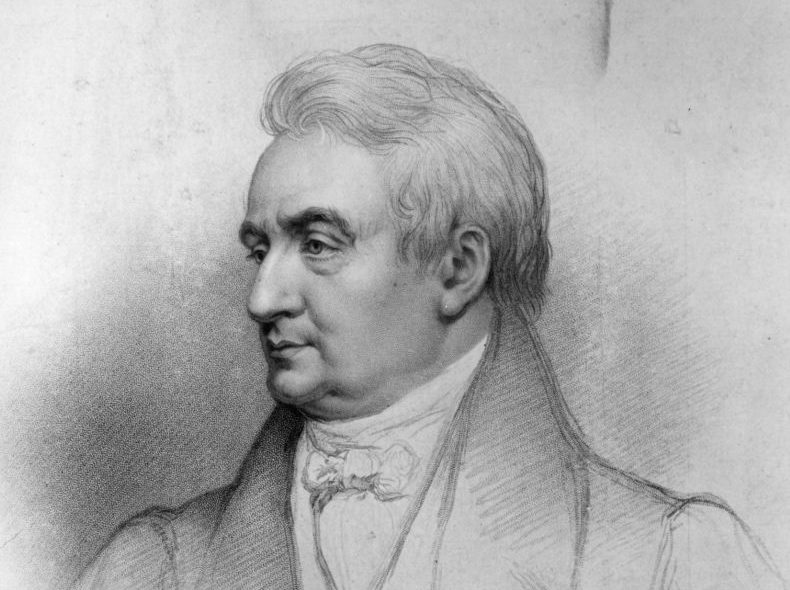Why should anyone care about Sydney Smith, who died on this day in 1845? 180 years have diminished the stature of his worldly achievements. He was an Anglican cleric who campaigned for an end to slavery, against the oppression of Catholics, for moral reform in the church and democratic reform in parliament. His political arguments have lost most of their interest in a world where those questions feel settled.
Smith helped found the Edinburgh Review. He suggested the motto ‘tenui musam meditamur avena’ – ‘we cultivate literature on a little oatmeal’ – but this was ‘too near the truth to be admitted, and so we took our present grave motto from Publius Syrus, of whom none of us had, I am sure, ever read a single line’, he said.
Forgiveness and optimism, Smith counselled, were duties
People who knew Smith loved him, and many more have done so by reputation. Smith was another Dr. Johnson, but where Johnson struck fear, Smith kindled warmth. His words were as memorable, his character as strong – yet his spirit was kinder. ‘You have been laughing at me constantly, Sydney, for the last seven years,’ said one friend, ‘and yet, in all that time, you have never said a single thing to me that I wished unsaid.’
He preached cheer, and what he preached he practiced. ‘Madam, I have been looking for a person who disliked gravy all my life; let us swear eternal friendship.’ Putting his neighbour at ease came naturally to him, as did urging people to happiness. ‘Many in this world run after felicity like an absent man hunting for his hat, while all the time it is on his head.’
People loved Smith’s wit – but even more, they loved Smith. How could they not, when he brimmed with love himself? Smith was amiable – worthy of love and worth loving – because he found his fellows amiable, and because he had the wit to make them feel that this was the case, even when he mocked. Macaulay called him the Smith of Smiths. The two great conversationalists were friends. ‘Macaulay,’ said Smith, ‘has occasional flashes of silence that make his conversation perfectly delightful.’
Smith believed ‘life is to be fortified by many friendships. To love, and to be loved, is the greatest happiness of existence.’ He preached that someone need not be in front of you to survive in your heart:
If I lived under the burning sun of the equator, it would be a pleasure to me to think that there were many human beings on the other side of the world who regarded and respected me … It is not that a man has occasion often to fall back upon the kindness of his friends; perhaps he may never experience the necessity of doing so; but we are governed by our imaginations.
Like Johnson, Smith suffered from depression, but while the former was as brutal with himself as with others, the latter was playful and kind. ‘Dear Lady Georgiana, nobody has suffered more from low spirits than I,’ wrote Smith, ‘so I feel for you.’ He advised taking a short view of life – ‘no further than dinner or tea’ – and bade her keep busy. Good advice, then as now.
Forgiveness and optimism, Smith counselled, were duties. ‘Some very excellent people tell you they dare not hope; why do they not dare to hope? To me it seems much more impious to dare to despair.’ He wanted to be a barrister, but constraints meant he entered the church.
I am not leading precisely the life I should choose … [but] I am resolved therefore to like it and to reconcile myself to it; which is more manly than to feign myself above it … as long as I can possibly avoid it I will never be unhappy.
Giving a lecture at the Royal Institution, he asked his audience to picture life as a table with different holes, into which our characters must fit. A man, said Smith, must ‘find out where his powers lie, and what are his deficiencies’. Square pegs and round holes are a Smith-ism.
‘Don’t expect too much from human life – a sorry business at the best,’ he said in that letter to Lady Georgiana. Those low expectations were not a way of diminishing life’s grandeur but a reminder to seek joy where it could be found.
Man could direct his ways by plain reason, and support his life by tasteless food; but God has given us wit, and flavour, and brightness, and laughter, and perfumes, to enliven the day of man’s pilgrimage, and to charm his pained steps over the burning marl.
Smith lived when tragedy was an expected part of life – as, until recently, it always was. In 1829, his eldest son Douglas died. ‘His death was the first sorrow he ever occasioned his parents,’ reads the epitaph his father wrote, ‘but it was deep and lasting.’
He wrote to his friends of his grief:
I am very unhappy, and quite beaten but I shall get better … I never suspected how children weave themselves about the heart … God save you from similar distress! … I did not know I had cared so much for anybody; but the habit of providing for human beings, and watching over them for so many years, generates a fund of affection, of the magnitude of which I was not aware.
In his final days, as he slipped from consciousness, Smith’s last words were cries of his son’s name.
‘We know nothing of tomorrow;’ said Smith, ‘our business is to be good and happy today.’ Johnson is better remembered – not because his life makes a better lesson, but because he had James Boswell to chronicle it. Johnson knew agony and persevered, which is admirable. Smith knew agony too – but it made him cling fast to hope, which is lovable. ‘Have the courage to be ignorant of a great number of things, in order to avoid the calamity of being ignorant of everything,’ he taught. Wikipedia remembers him for a poem about the delight of a good salad dressing. He ate well. Gout, he said, was the only enemy he did not wish to have at his feet.
Even without his own Boswell, enough of Smith’s words survive to pepper our culture. His accusation that a friend’s idea of heaven was eating foie gras to the sound of trumpets, his declaration that he never read a book before reviewing it, since ‘it prejudices a man so’. Even part of his poem about salad dressing – ‘fate cannot harm me, I have dined today!’ – is remembered.
‘My sentences are frozen as they come out of my mouth,’ he said, of preaching at St Paul’s, ‘and are thawed in the course of the summer, making strange noises and unexpected assertions in various parts of the church.’ Not a bad image for the way a life may echo down the years. ‘Pleasure is very reflective,’ he believed, ‘and if you give it you will feel it.’
Smith still gives it today. Philip Larkin said that what survives of us is love. People loved Smith because love was how he lived. We love him still. He died having written of his thankfulness, and with grief for his son on his lips. Lost to that foreign country of the past, Smith lives on because his gift was to put love for life – real life, with its limitations and tragedies – into words.







Comments